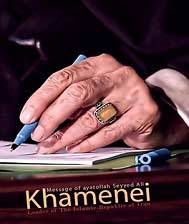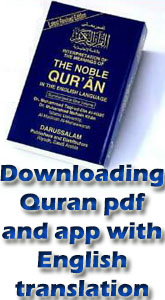I attended Muslim prayers several years ago when the speaker was talking about Jesus and Islam.
Question:
I attended Muslim prayers several years ago when the speaker was talking about Jesus and Islam. He said that the Qur'an talks about Jesus' family and a bit of his history that even the Bible does not include. I have been unable to follow up on this but would be very interested to know if this is true. I have an English version of the Qur'an and could look up any references provided. Thanks in advance.
Answer:
I do not know exactly in what context the above statement has been made but I believe that what he meant must have been that the Holy Quran's account of Hz. Isa's life is different from the Bible. You must bear in mind that the Holy Qur'an usually does not give a histographic account of events and has no intention of doing so. However it sometimes makes some historical statements in more general contexts of its teachings. This is also true with the story of Hazrat Isa (a.s).
In some parts, the Holy Qur'an endorses the Bible (such as the belief in the Virgin birth) and in some parts it refutes the Bible (like Hazrat Isa being crucified). You may call this different historical accounts, if you wish. But there is no history of Hazrat Isa (a.s) in the Holy Qur'an the way we understand history as chronological documentation of historical events and figures.
If you are interested in the subject of Hz. Isa (a.s) in the Holy Quran first you must know that the Holy Qur'an does not recognize the present Bible as the authentic Bible, and then you may want to consider the following points which I have selected from Ayt. Jawadi Amoli's Tafsir with Qur'anic references in parentheses.
1- Hz. Isa (a.s) is God's word (3:45). Everything is God's words but the emphasis of the Holy Quran on Hz. Isa (a.s) being God's words means that he is a Complete Word, meaning that his speech is God's speech.
2- He is Sign (Aya) of God because his speaking as an infant was a miracle (5: 110).
3- He is son of Maryam (3: 45; 5:110). The holy Qur'an usually does not refer to prophets as son of their fathers or mothers, the emphasis on Hz. Isa (a.s) being son of Maryam is to refute the Biblical notion of Son of God.
4- His name, Massih Isa was chosen for him by God (19: 7).
5- He was blessed in two ways, one of which was not shared by many other prophets. He was both chosen as a Prophet and also blessed with the Holy Spirit (2: 87, 253; 5: 110; 21:91; 19:17). Many other prophets were not blessed by the Holy Spirit.
6- He was able to give life to the dead and birds because of being blessed by the Holy Spirit (3: 49; 5: 110).
7- Maryam and Isa (a.s) both were one and the same sign of God (Aya) (23: 50). This observation has many crucial theological implications which I cannot elaborate on here.
8- Not marrying was because he did not have an earthly father and he was not born of human bodily desires.
9- His miracles did not elevate him to the status of divinity. He was honored to be God's servant (4: 172; 5: 117).
10- He was not God, and anyone who believes he was God is Kafer not even Mushrik (5: 17, 72).
11- He dissociated himself from those who believe in trinity (5: 116).
12- He was not killed nor was he crucified (4: 157).
One can add more points to the above but I hope these could give you some general idea as to how the Holy Qur'an introduces Hz. Isa (a.s) and what kind of differences exist between the Holy Qur'an and the Bible.
Refrence:
Ashura
- The Third Imam, Husayn Ibn ‘Ali (as)
- A brief look at the Life of Imam Hussein
- Karbala – the Rendezvous of Faith
- In the School of Imam Husain (AS) – 2
- In the school of Imam Husain (AS) - 1
- Ziarat-e-Ashura
- The Imam Husayn's Concepts of Religion and Leadership
- Karbala and the Imam Husayn in Persian And Indo-Muslim literature
- Hazrat Zainab's(s.a) Marriage
- Hazrat Zainab (s.a.) and Imamate
- Hazrat Zainab (s.a.) in Karbala
- Who was Yazid?
- SHIMR B. ZIL JAWSHAN
- The Imam’s Brother, ‘Abbās's Martyrdom
- The Martyrdom of Abalfazl-Abbas(A)
- The short life History of Hadhrat Abbas (as)
- Titles of Hazrat Abbas (a.s.)
- The Imam’s Brother, ‘Abbās's Martyrdom
- A short biography of Hazrat Ummul-Baneen (s.a)
- The Standard Bearer of Husain
Articles
- The Actions of God
- Methods of Tabligh (propagation)
- The Signs of the Appearance (Zuhur) of the Mahdi
- Further Investigation in the Hadith-Reports
- How Will the Imam Know That the Time for the Appearance (Zuhur) Has Come?
- The Minds of the People Prepare for the Advent of the Mahdi
- The Residence of the Twelfth Imam
- The Research about Longevity
- The Sunni Books on the Characteristics of the Mahdi
- Why Did Not the Occultation Become Complete from the Beginning?
- Can a Five Year Old Boy Become an Imam?
- Who Was the Imam after Hasan Al-'Askari?
- The Unseen World and the Imam of the Age
- Mahdiism, the Jews, and the Iranians
- The Pseudo-Mahdis
- The Beginning of the Belief in the Mahdi
- Love, Sexual Discipline and Chastity. Democratic Morality, Love in Personality Growth
- Basic Need for Humane Conditioning of Natural Instincts And Desires
- A Critical Examination of The Theoretical Basis of The Proposed New Sexual Freedom
- Proposed New Sexual Freedom
Shiite Studies
- Who is a Real Shia Muslim?
- SHI'ITE RELIGIOUS THOUGHT
- Heavenly Warrant
- What does “Shi‘ah” mean?
- Why do the Shī‘ah prostrate on turbah (dried clay)?
- Is according to Islam religion separate from politics?
- What are the sources of Shī‘ī jurisprudence (fiqh)?
- Shia’ jurisprudence
- The features of Shia' ethics
- 22 Not a new lifestyle
Wahabiyat

I am a film writer writing a film presently with the aim of promoting Islamic unity and solidarity
the most visited materials
- Who Is Almighty Allah? (256821)
- Who is a Real Shia Muslim? (242540)
- Islam and Its Social System (239247)
- How I find that Islam does not Oppress Women? (237990)
- Brief History of Religions (237922)
- Islam Attacks Slavery 1 (237114)
- The Clearest Reason for Free Will (236036)
- The Advantages of Religion 1 (235222)
- Attributes of The Real Follower of Imams in Their Teachings (231794)
- Fundamental principles of Islam (231343)
- RIGHTS OF SCHOLARS (230778)
- The Rights Islam Offers to Women (230358)
- Islam Various Systems (228712)
- What are the differences between Shia and Sunni Muslims؟ (228694)
Islam Studies
- Fundamental principles of Islam (231343)
- RIGHTS OF SCHOLARS (230778)
- Islam Various Systems (228712)
- Some Hadithes on the Faith of AbuTalib (128976)
- Islam and the Genuine Needs of Every Epoch (119673)
- Islam and Racism (117120)
- Why did God locate Kaaba in a barren desert? (110221)
- Islam and Traditional Sexual Ethics (107586)
- Does Islam permit Contraception? (107234)
- Importance of Marriage in Islam (105904)
- How to ponder on the Philosophy of Islamic Laws? (96858)
- Is there any consensus on prohibition of constructing mausoleum? (96070)
Judaism،Christianity
- I attended Muslim prayers several years ago when the speaker was talking about Jesus and Islam. (72184)
- I have been fortunate in the sense that I had a Muslim father and a Christian Mother. (71980)
- Sir I was looking for some precise proof of our belief that the Bible available in the current time is corrupt, through protestant beliefs and the proofs being scientific as well. (62502)
- What does Islam say about Prophet Isa (pbuh) walking on water? (59998)
- Is it a sin reading the Bible? (59524)
- Do Christians acknowledge the Prophethood of Khidhr and recognize him officially? (59152)
- Is it true that Lady Maryam would receive food and fruit from heaven? (58484)
- In verse 55 of Aal-i Imran, God states that: (57603)
- Why do they call Prophet Isa “The Spirit of God”? (56305)
























